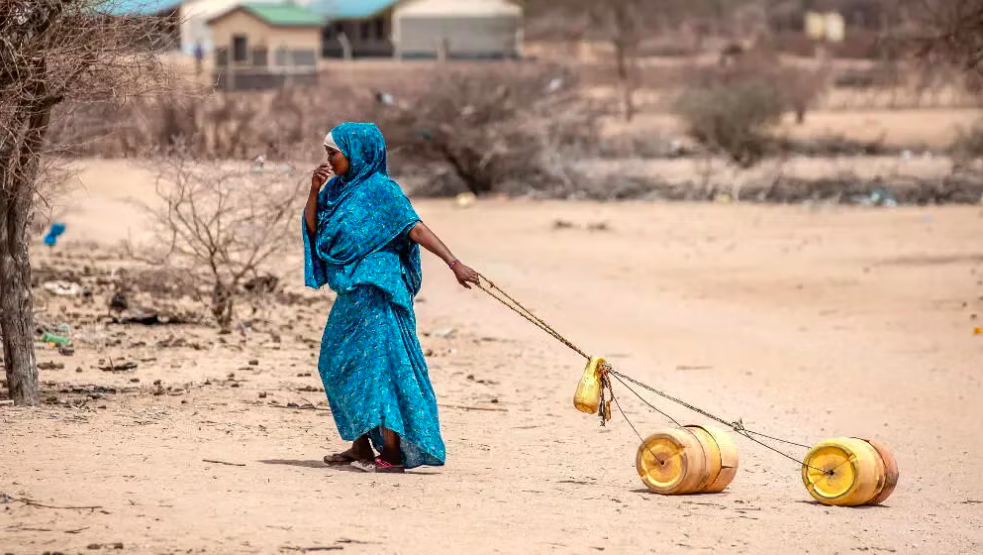 A woman pulling water drums. The scientists found clear, measurable links between extreme weather events and increased levels of depression and suicidal thoughts.
A woman pulling water drums. The scientists found clear, measurable links between extreme weather events and increased levels of depression and suicidal thoughts.What does climate change have to do with suicide? A lot more
than you might think.
A new Kenyan study has found that as temperatures rise, rains disappear, and food becomes scarce, many women begin to spiral into depression, and some start thinking about ending their lives.
The research, conducted in Kilifi County, shows that the combined stress of extreme weather and food insecurity increases suicidal ideation by nearly half.
The study, led by experts from the Brain and Mind Institute at Aga Khan University Nairobi, is the first in Kenya to provide hard data linking worsening weather conditions to rising rates of depression and suicidal ideation.
“Our study shows how consistent exposure to climatic shocks
may influence people's quality of life including exacerbating depressive and
suicidal ideations and self-harm behaviours. Indeed, vulnerable Kenyan women
are paying the highest price from these climate shocks,” the authors said.
They surveyed 14,801 women across Kilifi’s Kaloleni and Rabai sub-counties. Their findings are striking. Women living in slum-like rural settlements without access to toilets, clean water, or reliable electricity were far more likely to suffer from depression and suicidal ideation after climate-related events than their counterparts in better-serviced rural homes.
The authors report that drought alone caused a 36.7 per cent increase in suicidal ideation, while less rain led to a 28.7 per cent increase, and heatwaves drove a 14.9 per cent rise in suicidal thoughts. But it was the accumulated stress of these events, combined with food inflation, that delivered the most devastating blow – nearly one in every two women (48.3 per cent) in these vulnerable areas reported suicidal thoughts under such conditions.
The findings were published on Monday in the eBioMedicine
journal in a paper titled “The impact of climate shocks exposure to depressive
and suicidal ideations among female population in Kilifi rural areas, Kenya.”
Lead author Prof Cyprian Mostert, the brain health economics lead at the Brain and Mind Institute in Nairobi, says these findings are not just coincidental, they confirm what many frontline workers have long suspected.
“We found clear, measurable links between extreme weather events and increased levels of depression and suicidal thoughts among women in Kilifi County, a region where most families depend on small-scale farming and are heavily reliant on the weather,” Prof Mostert wrote in an opinion article discussing the study.
“What makes this research notable is that we were able to demonstrate, with robust data, that these mental health struggles are not just coinciding with climate events; they are directly caused by them.”
 Lead author Prof Cyprian Mostert, the brain health economics lead at the Brain and Mind Institute in Nairobi.
Lead author Prof Cyprian Mostert, the brain health economics lead at the Brain and Mind Institute in Nairobi.The other co-authors are from the University of Dublin, New York University, and the Euro-Mediterranean Economists Association of Spain.
Prof Mostert adds that women in informal settlements bore the brunt of the crisis.
“Compared to those from more stable rural households, they were significantly more likely to experience psychological distress after climate-related events. For instance, when rainfall was low, reports of suicidal thoughts rose by nearly 30 percent. When rising food prices were factored in, that figure increased even further.”
Kilifi is one of Kenya’s most climate-vulnerable regions,
often enduring intense heat, unreliable rainfall, and food insecurity. With
high unemployment, poor infrastructure, and limited access to health care, it
creates a perfect storm for mental health deterioration.
The researchers used a combination of meteorological data and surveys that captured depression levels using a standardised tool known as PHQ-9, which includes a specific item measuring suicidal ideation. They also factored in variables like distance to health facilities and household conditions to isolate the effect of climate events on mental health.
They also found that mental health services are almost nonexistent in many of these areas. Cultural stigma makes it even harder for affected individuals to seek help.
Prof Mostert says mental health should be integrated into every climate resilience plan. “As Kenya adapts to climate change, mental health should be prioritized alongside food security, water access, and economic development. These issues are deeply interconnected.”
The authors pointed one major limitation. They said the depression assessment is only indicative of possible depressive symptoms and is not a confirmed clinical diagnosis.
They then recommended that future research expand to include male participants.
The Kilifi study joins a growing body of global research showing that climate change is not just an ecological crisis, it is a mental health emergency.
In the United States, a 2018 study published in Nature Climate Change found that for every 1°C increase in monthly average temperature, suicide rates rose by 0.7 per cent in the US and 2.1 per cent in Mexico. The researchers concluded that “climate change could result in an additional 21,000 suicides across the Americas by 2050 unless action is taken.”
In Australia, one of the most climate-sensitive countries, experts have coined the term “eco-anxiety” to describe the psychological toll of extreme weather events like bushfires, floods, and prolonged droughts. There, mental health services have begun factoring climate exposure into therapy, especially in rural areas.
If you are struggling with mental health within Kenya, here are some emergency numbers you can reach out to for help: Kenya Red Cross/ Nacada 1199, Befrienders Kenya 0722178177.

![[PHOTOS] Ruto inspects his Naivasha farm](/_next/image?url=https%3A%2F%2Fcdn.radioafrica.digital%2Fimage%2F2025%2F06%2F72a14e8a-a040-48e1-87b3-597dbca6d7c6.jpeg&w=3840&q=100)









